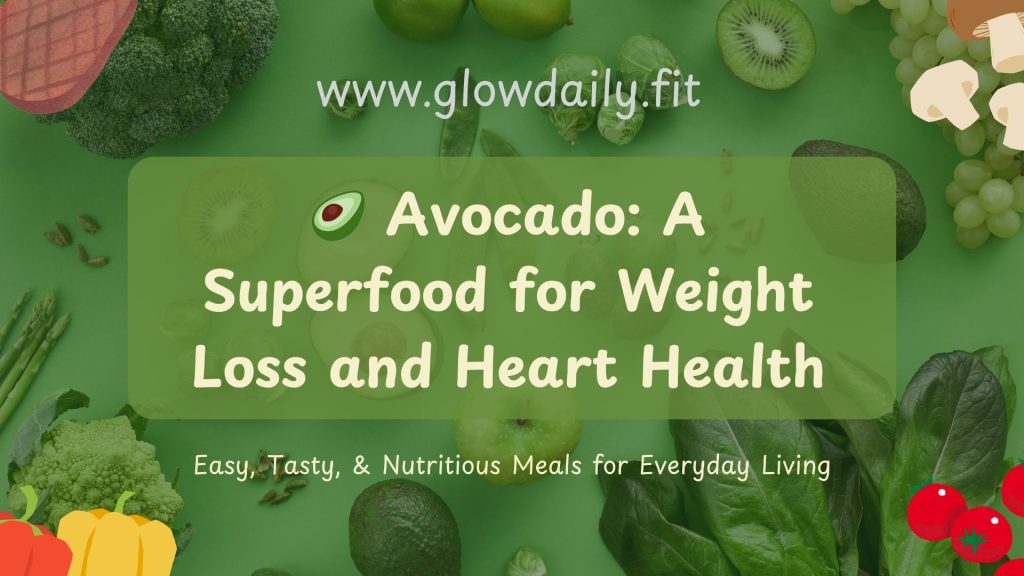Avocados have become one of the most popular foods in the world — and for good reason. This creamy green fruit is more than just a tasty addition to your toast or salad; it’s a true superfood loaded with essential nutrients, healthy fats, and antioxidants.
But what makes avocados so special for weight loss and heart health? Can eating this calorie-dense fruit really help you shed pounds while protecting your heart?
Let’s dive into the science, nutrition, and practical tips that prove why avocados deserve a permanent place in your diet.
🌱 The Nutritional Profile of Avocados
Avocados are nutrient-dense, meaning they provide a wide range of vitamins and minerals without excessive calories.
1 Medium Avocado (about 200g) contains:
-
Calories: 250
-
Healthy fats: 21g (mostly monounsaturated fats)
-
Fiber: 10g
-
Protein: 3g
-
Potassium: 975mg (more than a banana!)
-
Vitamins: C, E, K, B6, folate
-
Antioxidants: Lutein & zeaxanthin (great for eyes & skin)
This impressive profile makes avocados one of the most nutrient-rich foods you can eat.
⚖️ How Avocados Support Weight Loss
Many people are surprised when they hear that avocados — a food high in fat and calories — can actually help with weight loss. Here’s why:
1. Keeps You Fuller for Longer
The fiber + healthy fats combination slows digestion and prevents sudden hunger spikes. Studies show that people who include avocado in meals report greater satiety, which reduces overall calorie intake.
2. Regulates Blood Sugar Levels
Unlike carb-heavy snacks, avocados have a low glycemic index. They keep blood sugar steady, preventing cravings that often lead to overeating.
3. Boosts Metabolism
The monounsaturated fats in avocados encourage the body to burn fat more efficiently. This helps with weight management and maintaining lean muscle mass.
4. Healthy Replacement for Processed Foods
Instead of butter, cheese spreads, or sugary snacks, swapping in avocado provides a creamy, nutritious alternative that’s much lower in unhealthy fats and refined carbs.
👉 Quick Tip: Eating half an avocado before meals can reduce appetite and calorie intake by up to 40%.
❤️ Avocados and Heart Health
Heart disease remains one of the leading causes of death worldwide. Luckily, simple dietary changes — like adding avocados — can make a huge difference.
1. Lowers Bad Cholesterol
The monounsaturated fats in avocado help lower LDL cholesterol (bad cholesterol) while raising HDL cholesterol (good cholesterol). This keeps arteries clear and reduces heart disease risk.
2. Rich in Potassium
Avocados provide more potassium than bananas, a mineral crucial for regulating blood pressure. Maintaining healthy blood pressure is vital for preventing strokes and heart attacks.
3. Reduces Inflammation
Chronic inflammation is a silent driver of cardiovascular issues. Avocados are packed with antioxidants and anti-inflammatory compounds that protect blood vessels and keep the heart strong.
4. Improves Blood Flow
Nutrients like folate, magnesium, and healthy fats improve circulation, ensuring oxygen and nutrients reach your heart efficiently.
🥗 Delicious Ways to Add Avocado to Your Diet
The best part about avocados? They’re versatile! Here are some easy ways to add them to your meals:
-
Avocado Toast – Mash on whole-grain bread, sprinkle with chili flakes & seeds.
-
Smoothies – Blend with banana, spinach, and almond milk for a creamy texture.
-
Guacamole – Mix with lime, tomato, onion, and cilantro for a healthy dip.
-
Avocado Salads – Add cubes to fresh greens, quinoa, or chickpea bowls.
-
Avocado Desserts – Believe it or not, avocado brownies and mousse are both creamy and guilt-free!
👉 Pro Tip: Pair avocados with tomatoes, carrots, or leafy greens. The healthy fats help your body absorb fat-soluble vitamins (A, D, E, K) more effectively.
⚠️ Are There Any Downsides?
Like any food, moderation is key.
-
High in Calories: One whole avocado contains 250+ calories. Stick to half a fruit per serving.
-
Allergies: Rare, but some people may be sensitive to avocado.
-
FODMAP Food: People with IBS may need to monitor intake due to fermentable carbs.
But for most people, avocados are a safe and healthy addition to the diet.
📊 Avocado vs. Other Superfoods
| Superfood | Calories (per 100g) | Fiber | Healthy Fats | Heart Health Benefits |
|---|---|---|---|---|
| Avocado 🥑 | 160 | 6.7g | 15g | Lowers cholesterol, boosts satiety |
| Chia Seeds 🌱 | 486 | 34g | 31g (Omega-3) | Improves cholesterol & gut health |
| Almonds 🌰 | 579 | 12g | 50g | Rich in vitamin E, good fats |
| Blueberries 🫐 | 57 | 2.4g | 0g | High antioxidants, brain health |
Avocado holds its ground as one of the best all-around superfoods.
❓ FAQs About Avocados
1. Can eating avocado every day help me lose weight?
Yes, if consumed in moderation (½ avocado per day). Avocados keep you full and reduce cravings.
2. Do avocados burn belly fat?
No food directly “burns” fat, but avocados help reduce overall calorie intake and improve metabolism.
3. Is avocado good for high blood pressure?
Yes! The high potassium content naturally lowers blood pressure.
4. Can I eat avocado at night?
Yes, avocados are easy to digest and can even improve sleep due to magnesium and healthy fats.
5. Is it better to eat avocado raw or cooked?
Raw is best, as cooking may reduce some nutrients. Use it fresh in salads, smoothies, and dips.
✅ Final Thoughts
Avocados truly live up to their reputation as a superfood. From helping with weight loss to strengthening heart health, they’re one of the most versatile and beneficial foods you can add to your plate.
Just remember: moderation matters. Eating one avocado a day is enough to reap all the benefits without going overboard on calories.
So the next time you’re planning your grocery list, don’t forget to add a few creamy green avocados — your waistline and your heart will thank you.


